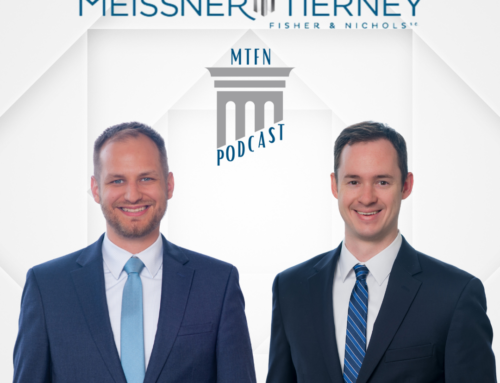As the COVID-19 vaccine begins to roll out, employers may be faced with the decision to mandate the vaccination for their employees. Such a decision would raise multiple issues, and before you move forward without a mandate, you should consider them.
The issues involved in deciding whether to require employee vaccinations are complex and implicate legal, business, and ethical questions. Below is a primer on some of the issues involved in this decision, but the outlined points are in no way exhaustive to all the considerations an employer must take into account. Contact the professionals at Meissner Tierney Fisher & Nichols S.C. for additional consultation before you act.
- Should an employer require COVID-19 vaccinations?
The health and safety of employees and customers are paramount concerns for any business. Preventing transmission of COVID-19 is an obvious imperative, but there are many methods of preventing transmission. Vaccination is simply one tool.
There is no question that an employer can strongly encourage vaccination and take active steps to encourage employees to be vaccinated. But the question is whether employers should mandate vaccination. Employers should consider factors such as workplace culture, the makeup of the workforce, and how a vaccine mandate will be perceived. A work environment that is already contentious or strained may be made more so by a mandate and viewed by employees as heavy-handed and authoritarian. This might be especially true while vaccine availability is limited. It might also be true as more of the public becomes vaccinated and broad immunity is achieved, and COVID-19 precautions are removed.
Employers will also need to consider how they treat existing employees versus new hires, as well as how to handle employees that may have unique employment contracts.
Alternatively, methods such as continuing required masking and social distancing, as well as remote working options, should be considered if appropriate and workable, and need to be flexible enough to meet the needs of the developing public health situation and individual employer/employee needs.
- Can employers require COVID-19 vaccinations?
Certain employers, depending on the type of business and applicable licensing requirements, can require COVID-19 vaccinations if they follow state and federal laws relating to an employee’s religion or disability in the context of vaccinations. Exemptions to vaccination mandates are also recognized under Title VII of the Civil Rights Act of 1964, as well as the Americans with Disabilities Act (ADA). All employers could strongly encourage vaccination, but whether a particular business can require it is the subject of a complex analysis depending heavily on an interrelated set of facts and circumstances, including the appropriateness of such encouragement that extends beyond mere legal analysis.
According to the U.S. Equal Employment Opportunity Commission (EEOC), COVID-19 meets the ADA’s “direct threat standard,” meaning that an employee with COVID-19 poses a “significant risk of substantial harm” to others.
On December 16, 2020, the EEOC released its updated guidance on vaccine mandates in the workplace[1]. The guidance supports the notion that an employer may require vaccines in the workplace, as long as there are exceptions that adhere to both the ADA and Title VII are available.
Health care employees may have particularly pressing needs to ensure staff and client safety. Health care employees who have had COVID-19 may be resistant on the grounds that there is no need or that a too early vaccination may lead to a reaction. In this setting, health care employers may have to isolate such staff for client safety.
Questions surrounding the coverage of workers’ compensation as it pertains to potential reactions from the COVID-19 vaccine are beginning to come up, and while it is an area of law that is still developing, there are certain situations where workers’ compensation for vaccine reactions is possible. For instance, if an employer keeps vaccines as voluntary for employees, workers’ compensation probably will not cover medical care in the event of a reaction, even if the employer arranges for a third party to administer the vaccine. On the other hand, if an employer requires workers to receive the vaccine to be on work premises and an employee experiences a reaction, the employee may be entitled to workers’ compensation. However, employers should be advised that this is not clear at this point. So, if an employer mandates vaccination, the employee has a negative reaction, and the consequences thereof are not covered by workers’ compensation or other insurance, there is potential exposure for the employer.
- How should an employer respond to an employee who indicates that they are unable to receive the vaccine?
Due to a disability
The ADA allows employers to have a qualification standard that includes “a requirement that an individual shall not pose a direct threat to the health or safety of individuals in the workplace.” However, if a vaccination requirement (or other safety-based qualification) screens out an individual with a disability, the employer must show that an unvaccinated employee would pose a direct threat that cannot be eliminated or reduced by reasonable accommodation.
If an employer determines that an employee who cannot receive a vaccination due to a disability poses a direct threat at the workplace, the employer cannot exclude the employee from the workplace, or take any other action, unless there is no way to provide proper accommodation.
If there is a direct threat that cannot be reduced to an acceptable level, the employer can exclude the employee from entering the workplace physically. However, this does not mean the employer may automatically terminate the employee.
Due to a religious practice or belief?
If an employer receives notice that an employee’s religious belief, practice, or observance prevents the employee from receiving the vaccination, the employer must provide a reasonable accommodation for the religious belief, practice, or observance.
- What can the consequences be for an employee who refuses to receive the vaccine?
Employers should consider what consequences and/or accommodations will be given to employees who refuse to receive the vaccination in the event of a workplace mandate.
Before imposing consequences on these employees, employers should consider whether less drastic action is advisable, and review the guidelines from the ADA, Title VII, CDC, Wisconsin Department of Health Services, OSHA, and EEOC. In addition to this, employers should review and revise their own policies to include reasonable accommodations and potential consequences as it pertains to a vaccine mandate. While each employee must be treated individually, an employer should establish a uniform policy or set of policies and communicate these changes clearly and effectively to employees in advance of any policy changes.
Given that some employees may not be able to be vaccinated because of disability or temporary circumstances, such as pregnancy, employers should consider whether mere masking and social distancing is sufficient protection from other employees who refuse to vaccinate for religious or personal reasons or from unvaccinated clients or customers? Given that vaccination is not 100% effective, should employers be continuing policies of social distancing and masking and remote working? Indefinitely?
As should be apparent, there are overlapping and competing considerations in this arena. Employers should be considering appropriate response(s) to COVID-19, if any, given the current and evolving circumstances, whether they want to enforce a vaccine mandate in the workplace, and what that mandate will look like. If you are considering implementing or enforcing a vaccine mandate at your workplace, contact experienced attorneys at Meissner Tierney Fisher & Nichols who can help you navigate these difficult waters.
[1] U.S. Equal Employment Opportunity Commission, What You Should Know About COVID-19 and the ADA< the Rehabilitation Act, and Other EEO Laws, (December 16, 2020), https://www.eeoc.gov/wysk/what-you-should-know-about-covid-19-and-ada-rehabilitation-act-and-other-eeo-laws






